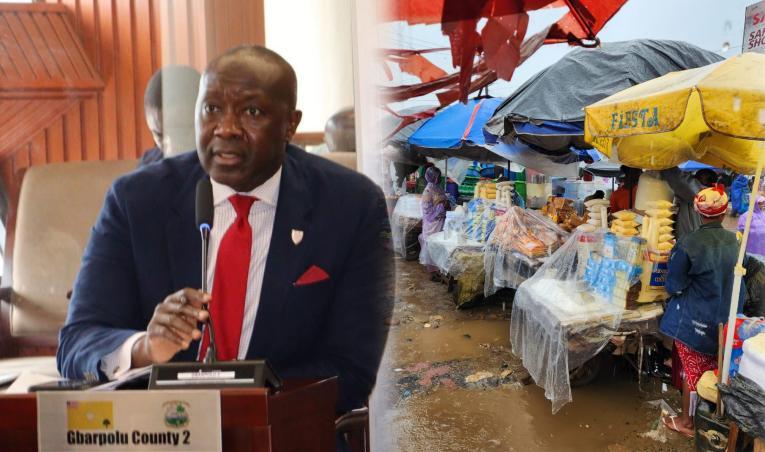Africa-Press – Liberia. Gbarpolu County Senator and Chairman of the Senate Committee on Public Accounts and Audit, Amara Konneh, has accused vendors of deliberately maintaining high prices on the local market despite progress made by the Government of Liberia (GOL) in stabilizing the economy.
In a statement posted to his official Facebook page on Monday, September 15, Senator Konneh said his recent visits to several weekend markets revealed that consumer prices remain stubbornly high, even though both the exchange rate and inflation have improved significantly.
“Yesterday, I visited a few weekend markets to gain insight into the persistence of high consumer prices, even with recent enhancements in both inflation and exchange rate metrics,” Konneh wrote. “My findings underscore a complicated set of structural and behavioral elements that are hindering the government’s efforts to achieve significant price relief for Liberians.”
Economic Progress, But No Relief
According to Konneh, under the leadership of Central Bank Governor Henry Saamoi, inflation has dropped from 13.1% in February 2025 to 7.4% in July 2025, while the Liberian dollar has strengthened against the U.S. dollar.
Despite these gains, he noted, vendors remain unwilling to lower prices. He described the phenomenon as “price stickiness,” where prices rise quickly but fall slowly, often due to fear of future losses.
“Vendors are voicing concerns regarding the sustainability of improvements in the exchange rate and the long-term stability of the Liberian dollar,” Konneh explained.
Why Prices Remain High
Konneh outlined several factors preventing price reductions:
High borrowing costs: The Central Bank has maintained a Monetary Policy Rate of 17.25%, making trade financing expensive.
Old inventory: Importers are still offloading goods purchased at higher prices, including rice, which President Joseph Boakai had promised would drop to US$14 per bag.
Dependence on imports: Liberia’s reliance on foreign goods makes it vulnerable to global and seasonal supply disruptions, especially during the rainy season.
Informal market dominance: With over 80% of Liberians trading in the informal sector, enforcing price regulations and tax compliance is difficult.
He added that while remittance inflows reached US$425.9 million in the first half of 2025—injecting more dollars into the economy—consumers have yet to see any benefit in the form of cheaper goods.
A Call for Policy Action
Konneh stressed that the disconnect between positive macroeconomic indicators and stagnant market prices leaves Liberians frustrated and raises questions for policymakers.
“Should the government adopt more proactive strategies to stabilize prices and promote reductions, or would allowing the market to adjust gradually on its own prove more effective?” he asked.
To find answers, the senator said he has urged his colleagues—especially those on the Senate Committees on Banking and Currency, Ways and Means, and Commerce—to convene discussions with the Central Bank, Ministry of Commerce, and Ministry of Finance and Development Planning.
Though the Senate is currently in recess, Konneh emphasized that the issue requires urgent attention to support President Boakai’s price reduction initiative and ensure that reforms bring tangible relief to ordinary Liberians.
“Through coordinated efforts and structural reforms, we can realize the full potential of our macroeconomic improvements and restore confidence in Liberia’s marketplace,” he said.
For More News And Analysis About Liberia Follow Africa-Press






